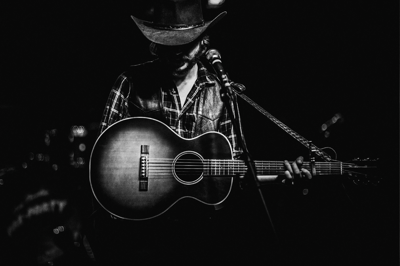
The motto of Swift Current, Saskatchewan — a prairie town about two hours north of the Montana border — is “Where Life Makes Sense.” Though it’s one of the most populous places in the southwest quadrant of its province, it is rural, with tauntingly beautiful surroundings. Roaming herds, sand dunes and green plains are never far from sight. In many ways, Swift Current (also known by the nickname “Speedy Creek”) seems like a perfect breeding ground for country music.
It is the birthplace of Colter Wall, a 22-year-old country singer with a voice as deep as the Earth’s mantle and the ability to shake you to the core with just a few woozy, lyrical breaths. His striking self-titled debut LP is all simple plucks, wandering characters and titles from the Woody Guthrie-Bob Dylan school (see “Transcendent Ramblin’ Railroad Blues”), and it sounds like the work of a man who grew up with dirt under his fingernails.
Except he didn’t. If you want to quantify “authenticity” in country music by actual ties to agrarian life, Wall won’t measure up. His father is Brad Wall, the premier of Saskatchewan and a very visible conservative politician. Colter’s upbringing may be the polar opposite of someone like Sturgill Simpson, who was the first man on his mother’s side to make his living outside a coal mine. But no matter where Wall is from or how he was raised, his words and the guttural rush of his delivery are profound and evocative. Colter Wall is more folk than pure country — think Tom Waits rumbling through some Townes Van Zandt — but the storytelling is as true to the revered storytelling tradition as it gets.
Wall’s knack for stirring murder ballads like “Kate McCannon” and honky-tonk confessionals like “Codeine Dream” stands as evidence against the importance of traditional signifiers of authenticity. “Thirteen Silver Dollars,” which you might look at as the matching bookend to Johnny Cash’s iconic take on “Sunday Morning Coming Down,” manages to be rich in evocative lyrical detail while leaving a bit of mystery for the listener. Wall sings over a spare and sturdy guitar line: “It was a cold and cruel evening sneaking up on Speedy Creek / Found myself asleep and in the snow / One or two odd reasons I ain’t too proud to repeat.”
And anyway, these days, you could make the case that Canada is more country than Nashville. Even setting aside the historic dominance of pop-country queen Shania Twain, artists like Lindi Ortega, Kacey & Clayton, and Corb Lund have carved a path for a contemporary strain of outlaw country that feels both urgent and relevant. All the same, Wall has made a new home in Kentucky, and found kinship with country tastemaker Dave Cobb, who produced his LP as well as records by Simpson, Jason Isbell, All Them Witches and many more.
Calling out Wall’s background makes about as much sense in evaluating the impact of his music as it would to rail against Gillian Welch, educated at Berklee, or Gram Parsons, the son of a WWII hero and the heir to a citrus fortune. Wall seems generally unconcerned about the issue, despite the frequency of questions from interviewers about a well-bred Canadian’s ability to make country music. Wall usually shrugs it off by pointing out that Swift Current is as “country” as anywhere south of the Mason-Dixon. But he shouldn’t have to.
Isbell, as credible a critic as you can get when it comes to songs that ring honest and true, said it best, as he is wont to do. “Strength of the song determines whether or not a ‘backstory’ means anything,” Isbell tweeted. “I don’t care where you cut your teeth, rather their sharpness.”
Wall’s teeth are certainly sharp enough to draw blood.
Email music@nashvillescene.com





